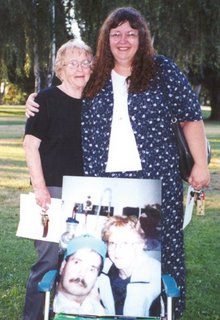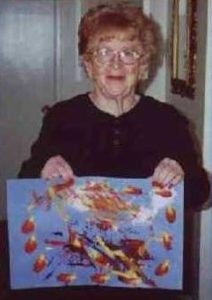 A shot of Florence and I immediately following the memorial service for her son, Robert Wendland, in July 2001.
A shot of Florence and I immediately following the memorial service for her son, Robert Wendland, in July 2001.That’s what I called my client, Florence Wendland, who died in early 2006 at the age of 83. After all, we spent six years fighting together to prevent her cherished son, Robert, from being dehydrated. And she came to be like a surrogate mother to me.She was an amazing woman, completely devoted to her children, grandchildren, great-grandchildren, nieces, nephews, and friends. She was an example of unconditional love, support, encouragement, and enthusiasm. She never once believed that she would lose her battle to save Robert. She never once let me get discouraged, even though it was my job to keep her spirits up.A weaker person would have given up. After all, even though Robert Wendland was not in a6 coma, persistent vegetative state, or suffering from the ravages of Alzheimer’s or dementia, he was severely brain-injured. And it had to be devastating for her to see her once strong, healthy 40-something-year-old hard-drinking, hard-working son sitting in a wheelchair unable to speak, paralyzed on one side, blind in one eye, wearing a diaper . . . while we all tried to figure out just how much of what was going on around him he really understood. It had to be heart-breaking.
But if you’d seen Florence with Robert, you’d never know it.
Because she was the epitome of the person who sees the glass as half full, rather than empty.
That was her baby boy, her first-born, her beloved son in that wheelchair — and she never let anyone, especially Robert, forget it.
You couldn’t help but love a woman who would answer the phone and, at the sound of your voice inquire, “How are you, dearie?” You couldn’t help but hug her back when she greeted you in person, perched up on her tiptoes, with a big hug.
You couldn’t help but admire and be astonished by a woman in her 70’s who sat in a courtroom day after day through an exhaustively protracted trial, listening to people talk about how her beloved boy would be better off dead. She endured hateful testimony from another son and her granddaughter Katy, both of whom shunned her. But, remarkably, she turned the other cheek, talked about how much she loved both of them, and proclaimed that her door would be wide open to them should they decide to come visit and set things right in their relationship.
As I read Michael Hofer’s name among her survivors today, I wondered if he or any of Robert’s three children ever did set things right with Florence before she left this earth. If they didn’t, they must live with their choice — they are the clear losers.
Florence had a deep, unwavering faith in God. She didn’t preach to you or get in your face about God. She just lived a quiet life that exemplified her beliefs. She spent time at the hospital with Robert reading him devotionals, Bible stories, and singing familiar hymns to him. She related that she used to tell him, “It’s ok, Robert. Jesus will take care of you. I know things are rough right now, but they’re going to get better.” She swore that he understood every word and would sometimes weep when she visited, but stopped when she spoke those words of comfort to him.
She was cared for and watched over by the staff at the hospital, a dedicated group of professionals who had to outwardly display neutrality throughout the legal proceedings. Like me, they kind of adopted her (and vice versa). I remember one Christmas when she was just beaming as she told me about the present she had received from the staff: A large container of bus tokens they had purchased for her as a group.
You see, although Robert’s wife and children stopped visiting him altogether in 1996, Florence spent at least three days per week at the hospital with him, riding the public bus all the way from her Stockton home in the morning and back again each afternoon about 4:00 p.m.
 Aside from when Robert died, there were only two times when I saw her get depressed and appear to momentarily lose hope. One was the day that the real “Dr. Death,” Ronald Cranford, testified during the trial. I warned Florence it was going to be a rough afternoon because I needed to elicit some very unpleasant information from Cranford and suggested that she not remain in the courtroom, but she wouldn’t budge. She said that she wanted to hear everything. As Cranford droned on dispassionately about the physical process of dying from dehydration, I could see that she was becoming distraught. She wasn’t alone . . . the judge had to clear the courtroom to let observers recover and regroup.
Aside from when Robert died, there were only two times when I saw her get depressed and appear to momentarily lose hope. One was the day that the real “Dr. Death,” Ronald Cranford, testified during the trial. I warned Florence it was going to be a rough afternoon because I needed to elicit some very unpleasant information from Cranford and suggested that she not remain in the courtroom, but she wouldn’t budge. She said that she wanted to hear everything. As Cranford droned on dispassionately about the physical process of dying from dehydration, I could see that she was becoming distraught. She wasn’t alone . . . the judge had to clear the courtroom to let observers recover and regroup.
The other time was when Rose Wendland’s attorney threatened to have her barred from visiting Robert at the hospital because Florence displayed his painting during an appearance on “Good Morning, America.” She was really scared for a few minutes there. But when I assured her that if Rose had the chutzpah to follow through on that threat, we would have a press conference to end all press conferences — and she could bring the painting! — she quickly became her feisty, scrappy self again.<
It was fitting that it was Florence who was at Robert’s bedside when he died of pneumonia in July 2001, even as the California Supreme Court was mulling his fate. She told me that just moments before Robert died, she asked him, “Can you see the angels, Robert?” and encouraged him to go and join them. So I wondered today when I learned that she had died if she saw those angels as she crossed over into eternity — and if one of them answers to the name of “Robert.” I hope so on both counts, and that she is now reunited with the son she fought so valiantly and tirelessly to save.
Rest in peace, “Mom.” You’ve earned it. And I am honored to say that I knew, loved, learned from, and fought alongside you.

1 Comment
While reading about this case I would say that if that were my husband no one would stand in the way of letting me do what I felt was best. Your words over the years in regards to this case and your beautiful memorial to his mother makes me question just what I would do in a similar situation.
You are good people, Janie